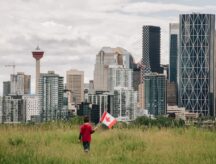The importance of municipalities for immigration and settlement in Canada
Municipalities across Canada are requesting a greater say in immigration and settlement planning, says a recent report by the Federation of Canadian Municipalities. Many Canadian city mayors believe that they do not receive enough funding to properly meet the needs of new immigrants and to cope with changing settlement trends. Municipalities are on the front line of helping newcomers settle and integrate, playing a critical role in building a strong and multicultural nation.
Large diverse Canadian cities like Toronto, Ontario, have a wide array of government-funded immigrant settlement services, which are a key component to successful settlement and integration of newcomers. Smaller municipalities, however, receive much less government funding and are finding it increasingly difficult to offer additional immigrant services to the growing number of newcomers.
The Federation of Canadian Municipalities (FCM) report indicates that although the majority of newcomers settle in large cities, a growing number of immigrants are choosing to settle in suburbs or smaller cities.
FCM President Jean Perrault is calling for a greater involvement on the part of municipal governments in federal-provincial/territorial discussions on immigration. With a greater voice for municipals governments, he says, federal investments in immigrant settlement can be better designed to meet municipal requirements.
"Cities are the primary providers of immigrant settlement services," says the Liberal Immigration Critic Maurizio Bevilacqua, citing the importance of direct federal funding to municipalities for newcomer settlement and integration.
Another recent report on immigration to Ontario indicates that half the people who immigrated to Canada between 1996 and 2006 settled in Ontario, with 456,000 settling in the Greater Toronto Area (GTA).
The City of Toronto, which receives a significant amount of federal funding for its newcomer settlement services, is the one of Canada's strongest examples of multiculturalism and the successful integration of immigrant communities. It is considered one of the most diverse cities on Earth, with dozens of languages spoken in the streets and nearly fifty per cent of the population belonging to visible minority groups. The city's official motto, "Diversity Our Strength" represents a population where 75 per cent are either first or second-generation Canadians.
Toronto is also considered the fifth-most-livable city in the world by an Economist Intelligence Unit report based on indicators of stability, health care, culture, environment, education, and infrastructure.
Nevertheless, the FCM report shows that immigrants to the GTA are increasingly choosing to live in Toronto's surrounding suburbs rather than the heart of the city. It is these municipalities, and other such smaller cities in Canada, that need greater federal funding to provide culturally sensitive services to newcomers, such as public health services, more affordable housing, language training, and targeted recreational programs.
Under the current funding allocation structure, it is up to provincial governments to determine where settlement money should be spent, says Julie Carmichael, a spokesperson from Citizenship and Immigration Canada (CIC).
"… [our] government has invested $1.4 billion more in integration projects since coming to office and that includes language and job training. Our focus now is on working with the provinces to encourage the uptake of those settlement services among new Canadians."
- Do you need Canadian immigration assistance? Contact the Contact Cohen Immigration Law firm by completing our form
- Send us your feedback or your non-legal assistance questions by emailing us at media@canadavisa.com



